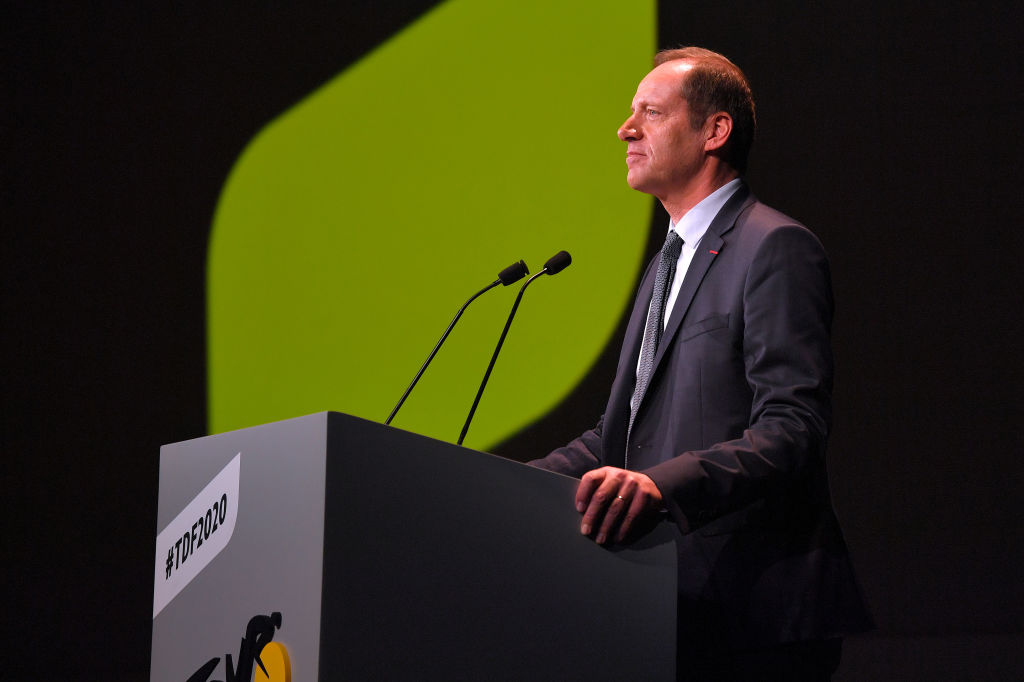Prudhomme's Tour de France for millennials
'We have to make things as varied as possible' says Tour boss

After unveiling a groundbreaking route for the 2020 Tour de France - low on time trialling, high on hills - Christian Prudhomme spoke of the battle to capture the increasingly fleeting attention of the 21st century audience.
The race director referred to the ‘civilisation de zapping’, a term that comes from the tendency of modern television viewers to restlessly flick through channels, and insisted: "We have to make things as varied as possible."
The 21 Tour de France stages laid out on Tuesday certainly make for an atypical route that was described as 'unprecedented' by both Julian Alaphilippe and Romain Bardet. The first week, which takes in three mountain ranges, is surely the one of the toughest in the history of the race, with the first major climbs coming as early as stage 2 in the Nice hinterland, the first summit finish in the Alps on stage 4, a stage in the Massif Central on day 6, and two big outings in the Pyrenees before the riders even pause for the first rest day.
The theme continues in week two as the race heads back through the Massif Central and then to a summit finish on the Grand Colombier in the Jura, before a couple more stages in the Alps in the final week. Finally, the Vosges range hosts the race’s dénouement in the form of a time trial finishing atop La Planche des Belles Filles – the only race against the clock of the entire three weeks. Four-time champion Chris Froome described the route as 'brutal' - the hardest he’d seen in several years.
"We’re not looking to make it harder; we’re looking to make it more varied," Prudhomme said.
"In that respect, we’re lucky to be starting in Nice – for only the seventh time in 107 editions. When you think of Nice, you think of the sea, but we’re also at the foot of the Alps, and close to all of France’s mountain ranges. So we’re going to start in the Alps, go to the Massif Central, the Cévennes, Pyrenees, back to the Massif Central, the Jura, the Alps again, and the Vosges. The idea was to make it as varied as possible.
"It’s not that there are fewer stages for the sprinters, but they’re spread out. There are chances for the sprinters in the first week, but never two in a row."
The latest race content, interviews, features, reviews and expert buying guides, direct to your inbox!
Likewise, the climbing stages are spread throughout the three weeks, with Prudhomme and his colleagues hoping hostilities between the yellow jersey contenders could flare at any moment, rather than being limited to set-piece blocks in the Pyrenees and Alps. This year there are just two stages in the Pyrenees, neither with a summit finish, and the hardest day of the race in terms of elevation gain comes in the Massif Central on stage 13.
"The Tour is about the Alps and Pyrenees and always will be. However, in the last few years, we’ve been seeking out difficulties elsewhere," Prudhomme said.
"I’m very happy that we have summit finishes in three ranges that aren’t the Alps or Pyrenees. For me, that’s a good thing. We wanted to seek out novelties. These are places that are emblematic, beautiful, and tough, with very steep gradients. We have all the ingredients for a great battle.”
As for the paucity of time trialling, a recent trend that has now been taken to a new level, Prudhomme sympathised with the traditionalists but argued it was a necessary step given smaller and smaller time gaps seen in the mountains compared to the time trials.
"I dream of cycling where the climber distances the rouleur in the mountains and loses time against the clock, but nowadays that doesn’t happen," he said.
After a few years of trying to break the Team Sky/Ineos stranglehold, Prudhomme delighted in the spectacle of this year's race, widely regarded as the most exciting in three decades. The 2020 route seems an overt attempt to recreate this summer's drama, but he pointed out there's only so much he can do: "It’s the riders who make the race."
Patrick is a freelance sports writer and editor. He’s an NCTJ-accredited journalist with a bachelor’s degree in modern languages (French and Spanish). Patrick worked full-time at Cyclingnews for eight years between 2015 and 2023, latterly as Deputy Editor.
